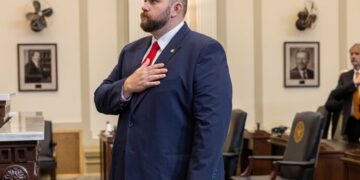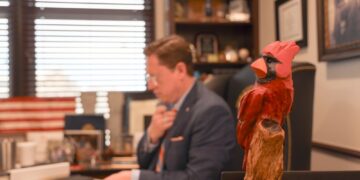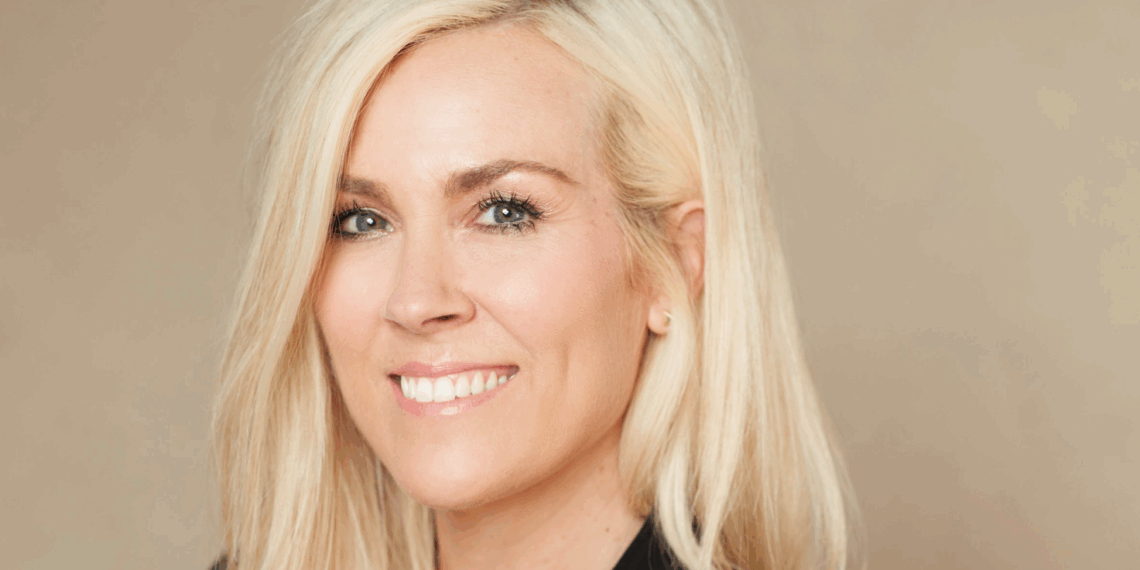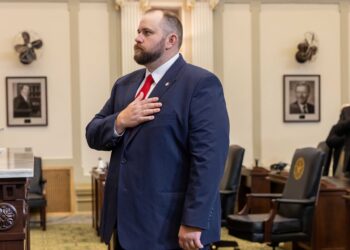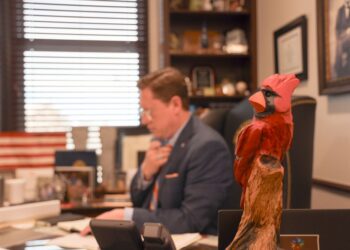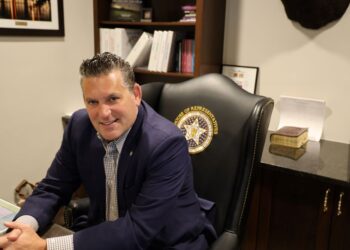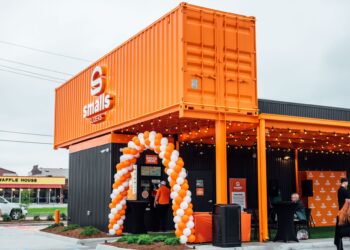OKLAHOMA CITY (OBV) – Television star and production company head Rachel Cannon wants Oklahoma to become a go-to destination for television sitcom productions. And she’s championing a bill that can help turn that dream into a reality.
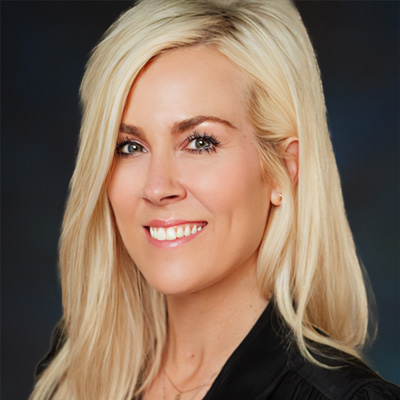
Cannon has big plans for Oklahoma’s television and film industry. Her new production company, Rock Paper Cannon, will produce live audience sitcoms here in the Sooner State.
She has fulfilled many dreams. She is a successful actor who has appeared in more than 80 television productions, including beloved shows such as Two and a Half Men, Big Bang Theory and Mad Men. She played a recurring character in the hit show Fresh Off the Boat. And as the former CEO of Prairie Surf Studios in Oklahoma City, she recruited major productions to Oklahoma, including Tulsa King and Twisters.
Her next dream is to transform Oklahoma into a sitcom production mecca. She says Oklahoma has all the right elements to become a destination for producing live audience television entertainment. All it needs is support from the state to make the dream a reality and give Oklahoma a dynamic, multimillion dollar industry that will grow the workforce and attract droves of out-of-state visitors.
Cannon said House Bill 2110 is an essential step in making sitcom production a viable Oklahoma industry.
HB 2110, written by Rep. Mike Osburn, R-Edmond, and Sen. Bill Coleman, R-Ponca City, creates the Bringing Sitcoms Home from Hollywood Pilot Program Act and establishes an incentive rebate program for live audience television series that are filmed or produced in Oklahoma.
The pilot program offers sitcom productions a minimum 25 percent rebate. The maximum incentive percentage is 30 percent. Eligible productions must have a minimum budget of $200,000 per episode, at least six episodes per season and a minimum of 50 live audience members for each episode. Production companies must also utilize apprentices to qualify for the rebate.
The Oklahoma Department of Commerce Film and Music Office will oversee the program, which is limited to $10 million in funding each fiscal year and will sunset on
July 1, 2032.
Cannon spoke one on one with Oklahoma Business Voice about the importance of House Bill 2110, why Oklahoma is an ideal hub for live audience sitcom productions, the state’s emerging film and television industry and what it will take to realize the industry’s burgeoning potential. The full interview is shared below.
What is Rock Paper Cannon? Is it a production studio that will film entertainment in Oklahoma, or will it produce shows in Oklahoma as well as in other states?
Cannon: Rock Paper Cannon is a live entertainment company that is going to focus on live audience shows, specifically sitcoms, and those are going to be anchored in the middle of the country. My desire is to be able to shoot all of those shows in Oklahoma, as long as all of the economics of that make sense. But they will be licensed to studios out in California.
Will Rock Paper Cannon have a physical studio anywhere in Oklahoma? Will there be a be Rock Paper Cannon where actual television productions are shot?
Cannon: Actual productions will happen here in Oklahoma. I’m not looking to build a studio campus at this time. But I will need to film with a live studio audience. That’s just not my business plan right now. We are producing the shows.
Is there currently a facility that would accommodate this vision in Oklahoma where you could film these live production shows?
Cannon: We’re currently working through some partnership opportunities to find spaces that will accommodate these types of shows as we grow and through the startup phase into what we hope to become a live comedy hub for Oklahoma.
Is Rock Paper Cannon more interested in sitcoms, or would it also incorporate productions such as dramatic series and docuseries, which are always so popular?
Cannon: Just multi-cam sitcoms. I’m only doing live audience sitcoms.
What inspired you to create Rock Paper Cannon?
Cannon: I’ve spent 25 years working in the entertainment industry, specifically in sitcoms, while I was in Los Angeles. This has always been my passion to be able to kind of focus on bringing live audience shows to the middle of the country. I paused on that for a moment while doing Prairie Surf Studios, where I was the CEO and founder, to be able to build the infrastructure that we needed here in Oklahoma so that you could have a foundation to build upon for the entertainment.
Were there any conversations that you had with people in the television industry that made you confident that a sitcom production company in Oklahoma could succeed?
Cannon: I’ve spent the last 25 years talking to my contacts in the entertainment industry. And I’ve always said that I thought this genre of television would be more successful in the middle of the country. And I think with COVID and strikes and the economics of the industry starting to shift more out of California and into lower cost hubs, we have become more desirable in the last five years than ever before for projects exactly like this to be able to exist in and outside of California. And I have spoken to all of my contacts in the industry at the studio level to say, “What do you think about this happening here?”
All of them are not only excited by the idea but are very encouraging to go produce those. We’d love to look at that. We’re always looking for stuff on the acquisition side. And then in terms of talent, you’ve got showrunners and actors and directors. Those are all people that I’ve worked with for 20 years that are very excited to be able to get back to doing live audience shows in a way that I think are elevated experiences where the audiences are fun.
[Being in a sitcom audience] feels like being at a Thunder game or being at a Broadway show or going to Sooner football. I want it to feel elevated like that, not just shuffling people in for a laugh.
What is it about middle America, this part of the country, that makes it ideal for sitcom productions?
Cannon: Middle America has been the core demographic for live audience sitcoms—multi-camera sitcoms, specifically—for all of time. Think back to I Love Lucy and Roseanne and Everybody Loves Raymond. We have been the audience. We just haven’t been the live audience necessarily, unless we decide to travel to California to watch the tapings of those shows. The people who watch the shows on network television have always been middle America.
So, I think there’s such a massive opportunity to shift things to a place where we are serving an underserved market, because you look at the shows that are being created right now, they’re oftentimes being created for the coasts. So, I’m looking to create shows for the 200 million people between those coasts and really targeting what are the core values and the core relatable situations that we find relatable here in the middle of the country and really serving up an opportunity to tell those stories.
As far as storytelling and finding those stories that are relatable, how would Rock Paper Cannon participate in that? Which side would you try to speak with? Creatives? Writers? Producers? Would they bring you ideas for sitcoms and you would produce them, or would you seek out ideas?
Cannon: Both. We’re an independent studio. We are literally doing television from development to distribution and marketing. We independently finance and produce television. We discover the ideas, we nurture those ideas, then we greenlight those into production. We produce those concepts, and then we take them out and we market them for distribution. We handle that, and that becomes an asset in our library that we get to monetize over and over again.
You were talking about how middle America is so closely connected to classic sitcoms, how those shows played in so many households for generations. The live studio dynamic is not as present in television as it used to be. Is there a movement to bring that back? And you spoke about wanting to elevate sitcom production. How do you see Rock Paper Cannon doing that?
Cannon: Rock Paper Cannon really was born out of a desire to create more entertainment experiences for the people in the middle of the country. It’s two parts. The part about bringing it in front of a live audience and letting Oklahomans be a part of the tapings, that’s my love letter to Oklahoma. That’s not the core business model. That is something that makes it fun and engaging for Oklahomans to experience. And it’s also a great test market because that is my audience.
The part of the business model that makes sense is the economics of bringing a production to the middle of the country, working with our rebate program, working with our low cost of living, and our opportunities to be in a business-friendly region, which is something that I think The State Chamber has done such a good job in and shepherding and being able to do those productions at a lower cost and then licensing them to a studio. Now you’re creating more cost-effective content, which, to answer your question, is the demand of Hollywood right now. So, coming out of the strikes and coming out of the pandemic, productions have been given a 30 percent increase where they’re trying to figure out, “How do we make these shows cost effective anymore?” And the answer is you have to do them for less. Well, it’s hard to do them for less on the studio lots in California. But if you’ll come to the middle of the country, you can do them for less here because of the economics that we’ve set in place. So, we are at a cost advantage here. But I think we are also in a place in the middle of the country where there is a market demand for it.
It’s creating exciting entertainment, both that is, able to be licensed and sent out for distribution. And that’s the business model of how it really makes money. But it’s also creating wonderful entertainment opportunities for the families here in Oklahoma. Because these are value driven entertainment—like these shows that you grew up on, that we all grew up on—it’s to put the full family back on the couch watching TV shows together instead of having everybody siphoned off in their rooms, watching their own programs. I want everybody back on the couch and watching things together that are relatable shows that are about a group of friends or a family or some coworkers. They are situational comedies that work because they’re simple.
Do you think television has lost that family/community sensibility? Do you think it’s still present? Or do you think it’s changed in some kind of way?
Cannon: I think that it has changed in the way that Hollywood is producing shows that are not hitting the mark for the middle of the country. I think the desire to create those shows is there. They’re just not doing it well. And I think that if you hand something to them that has been market tested and that hits those notes for the middle of the country, they’re looking for that.
That’s why you make it and then take it out for acquisition instead of asking them to develop it and pay for it, or they’ll just mess it up again. I want to be able to show the stories that I think people are craving to see on television again. And there is a massive renaissance for live audience sitcoms right now.
So, the 24 and 25 upfronts have literally said, “We want more situation comedies. We want more procedural, medical dramas, and cop shows, because those are built for syndication. Syndication is what everybody needs right now, which is these high-volume machines of television. You need that on cable, you need that on network. Streaming is looking for it.
There is a massive demand for these type of shows because they move into that ad revenue model that everybody got away from for a while. And now they realize desperately that, “Oh, that’s how we made our shows profitable.” So, they have to come back to that ad revenue model and syndication type programing. Those are the ones that are built for commercial breaks. And it’s hard to put a commercial break in the middle of Stranger Things.
With streaming services now, they’re incorporating the advertising aspect.
Cannon: Everybody needs it. There is a massive demand for sitcoms right now. Variety posted that (California Governor) Gavin Newsom is looking to increase their [film and television production] rebate from $330 million to $750 million, specifically [saying] we want to now add for sitcoms and game shows to be able to stay here in California. The reason is because that’s been the bedrock of their studio programing for a very long time. And we’re coming after that.
We have legislation here that passed the Oklahoma House of Representatives—House Bill 2110 by Mike Osburn that will be carried by Senator Bill Coleman in the Senate—and it specifically is calling out live audience, episodic television for a pilot program. We want to incentivize that type of high volume shows to come to the middle of the country. Because it can stabilize our industry. It creates jobs. It’s massive for tourism. And it’s less money from the state to be able to create these types of programs.
Did you have any input in the creation of that bill?
Cannon: I sure did, yeah. I’ve worked with our legislators to try and think of things that can stabilize our workforce and stabilize our industry for less money. Because these blockbusters are wonderful. And I was definitely behind bringing those here because I think they put us on the map and they did a great job, and they created high paying jobs, and they really created the economic input that we needed for our legislators to want to continue to invest in this industry.
This is something strategically that I think can help stabilize the job creation while we are going after those bigger projects. But we have shows consistently being produced here.
You talked about the economic conditions here being desirable to getting these productions over here. Are you referring to the rebate that the state offers?
Cannon: The rebate that the state offers plays a big role in it, but it’s also just the economics of living in the middle of the country. Doing business here, it’s cheaper. Our hotels are cheaper. Our gas is cheaper. There are a lot of things.
I like to point out that it’s not that our labor is cheaper. I’m not looking to pay our people less. I’m looking for the built-in economics of it being a lower cost of living community; that you get to come and do your projects, and your money goes further. Because the rates are set by production, they’re going to pay the same rates. In a right-to-work state, it’s a union project. Therefore, the people get paid a union rate whether or not they’re in the union, but then they become union eligible. And that’s how we get our people paid better. Because the average wage in this industry is $106,000 a year; and most of the time, they do that in six months.
That’s $106,000 a year for which jobs?
Cannon: For the below, the line crew positions.
To have these productions here in Oklahoma, you’re going to have to have a workforce to support it. Do you feel that Oklahoma already has that workforce that is skilled and has the know-how to work on a television production? Are you going to seek homegrown talent to work on these crews, or are you going to bring in workers from out of state?
Cannon: It’ll be a combination of all of those. I think that we have done a really great job developing the workforce for the entertainment industry. In the past few years, specifically, there are a lot of programs at Oklahoma City Community College, at the CareerTechs, colleges, universities—everybody is really pushing towards development of skilled labor in the entertainment industry.
We have put so many people to work on Killers of the Flower Moon and Reservation Dogs and Reagan and Twisters and Tulsa King. They’ve gotten to train up and they’ve got wonderful training on some of these high-budget projects. That skilled labor is now going to be able to come into these television productions where they’re able to work some of the same skilled trades. There are going to be some that are different. But the ones that are coming in on the broadcast side, those are going to be very similar to the jobs that are at a Thunder game or at a football game. Because those live broadcast rolls for camera or electric or boom operators, those people are already working at the Thunder games. I think we have the industry here. It’s just teaching them how to do it on television. In California, you had the same crew that was doing Staples Center shows or going to the Dodgers games. That was the same crew that was coming over and doing sitcoms. It’s live broadcast.
So, I think it’s taking people from both that industry and the entertainment industry and creating another genre of entertainment here in Oklahoma that can create high-paying, consistent jobs.
And I imagine there’s some talented people who live further out West who might move here. They might enjoy the cheaper cost of living, and maybe they could become mentors to younger generations here in Oklahoma.
Cannon: There are so many people in Los Angeles that have worked exclusively in sitcoms for decades. Those of us that have worked in this industry, we love sitcoms. We are diehard for that genre of television. And if there’s a place where we are creating a comedy hub where those types of programs happen consistently, I guarantee you there will be people from the industry that will want to move their families here for a lower cost of living and a better quality of life.
This is where the jobs are. This is where the people are going to want to come in and do those jobs. The other thing is, people will move for TV. They will not move for a movie. They’ll go and stay in a hotel for a movie, but they will move their families for the consistency of television.
And just to show the difference between sitcoms and these big budget comedies that you’re seeing on Apple or Netflix. The average shelf life of those shows—like, let’s say The Bear or Barry or Ted Lasso—those typically are about 30 episodes for the life of the show. And that’s because they’re 6 to 8 episodes a season, and they go three, four, maybe five seasons. But that’s kind of it, and then they’re done. That’s going to create three months of work and then they’re done.
What I’m talking about bringing here is the live audience shows. And if you think about the [live audience] shows that are on air right now, it’s The Conners, The Neighborhood, Bob Hearts Abishola, those types of shows. The average life of those is seven seasons and 112 episodes in the entirety of the show. So, that is more like 10 months of work. It’s the most consistent job that you will get in the circus, which is what we are.
That is something that’s great about classic TV, you get 25, 27 episodes in a season. Do you hope to have that kind of volume?
Cannon: Absolutely. We will start with 10 episodes and then get that licensed and hopefully come back for the back 10. And then we want at least 20-episode seasons that we’re bringing in. We are looking to go back to that model. And that is desirable by cable, network, streaming, fast channels. There are so many more places that you can license content if you’re going in for a high-volume business model, because that’s what everybody needs right now. Every outlet needs content.
Sitcoms have always lived and breathed on network TV. It was the bread and butter for TV for so long. Is there a want for sitcoms within streaming services?
Cannon: Network television has done these types of situational comedies for a really, really long time. And they have been the most profitable shows of all time. If you look at the billion dollar club, if you look at the shows that have made billions, you’ve got The Simpsons, which is an anomaly because it’s been on forever and it will continue forever.
But then you’ve got Big Bang Theory, you’ve got Seinfeld, you’ve got Friends. Those are all approaching $5 billion in revenue that they’ve made over time. And those are the types of shows that go licensed deal after licensed deal after licensed deal, because those are shows that people like to consume over and over and over again.
We think that there is such an opportunity for that type of programing to come back. You’ve got a lot of kids bingeing Seinfeld right now. They say, “Have you seen this show? It’s hilarious.” Twenty-somethings are now discovering that, because they’re watching it on Peacock. The streaming platforms are seeing more of their shows that are being binged are situational comedies. So, they see a demand for it. They’re now coming back.
But a lot of your streaming platforms are coming from broadcast, so you’ll have ABC and you’ll have Disney and you’ll have Hulu. That’s all on the same network. You’ll have NBC and Universal. Well, that’s Peacock. Most of the networks also have streaming partners. But Netflix is doing sitcoms. Apple is interested in exploring that. They’re all interested in looking at it, whether or not they’ve created it yet. But Netflix has done sitcoms. They had one of the first ones a few years ago called The Ranch, and it went 80 episodes and did very well.
Do you think our culture needs more of the type of comedy, comfort, and reliability that sitcoms provide? These are pretty serious times. Is there a place for the kind of comedy sitcoms offer?
Cannon: I think that we are so divided culturally right now. And I think suicide and depression and anxiety are at an all-time high because people are divided, and people are having relationships with their phone more than they’re having relationships with people.
What I love about comedy, I think it is such a gift to provide laughter, because when you’re laughing, you’re not fighting. And when you’re sitting in a room together and you’re laughing at the same situation that you find relatable, whether it’s from this character’s point of view or this [other] character’s point of view, it’s pulling people together and showing us that they’re more alike than different. Because the only way situational comedies work is if there’s conflict built in the middle of it. I think it’s a wonderful way to show how to deal with conflict, in a way where there is a solution at the end of it. [An episode] is 22 minutes, and there’s a problem at the beginning and it’s solved by the end of the episode. And I just think that the world needs more laughter right now. And I think being able to put these kind of shows out there to show the world that we’re more alike than different is a really powerful opportunity.
What I’ll also say is the laugh track, because I get asked about that a lot. Here’s why the laugh track is so important. Because sometimes you’re able to watch it with a group of friends. Sometimes you’re sitting in a room, and you’re able to watch the live taping and you’re with a big group of people. Sometimes you’re sitting alone, and the only thing that you have to show you that you’re not alone is the laugh track of other people laughing with you. And that can be really healing for people. So, I’m a big proponent of the laugh track.
Let’s talk about goals for Rock Paper Cannon. Have you outlined what your first-year goals would be? Or your second-year goals? Or even five years down the line?
Cannon: Rock Paper Cannon has launched our entertainment company here in Oklahoma. We’re putting all the pieces together, whether it’s legislation, the operational, the location. We’re putting all of that part together. We’re also developing our first slate of projects, which would be the first three shows that we produce over the next 10 years. We would like to be able to produce 10 shows in three years.
A lot of these shows end up going seven seasons, 115 episodes. That’s our average, right? So, if we have one show that ends up being a hit and it goes for seven or eight seasons, you’ll have a second show in conjunction with that. You probably won’t launch your third show until the first one goes dark, because you want two of them going at a time, because that’s how you can share crew and share and some of the economics to make it work really well. But if you have three, that’s a really tight work week for a lot of people.
We do see the value of creating these shows that will be independently financed here locally. I want Oklahoma to benefit from every level of this from the top down. And that means the capital too. The investment in the capital stack, I want those to be Oklahomans who get to invest in something new.
I’m taking time to partner with people from Oklahoma who really understand, “Oh, this is the opportunity that we get to participate and to be a part of this industry.” Twisters comes, they spend a lot of money here, and they create jobs, but they don’t offer opportunities for the creatives who are the writers or the directors or the producers or the actors. A lot of the top of the line positions, those aren’t available. Same with the business community. Universal isn’t coming in, allowing our investors to participate. They’re not looking for our marketing execs or our HR payroll or legal. Those are jobs that typically stay in the studio system in California.
If we anchor this here and you let everybody participate from the top down, then Oklahoma really, truly has ownership over this industry in a really unique way. And I think that creates generational change.
I imagine that you’ve begun conversations with networks and streaming services. What kind of potential clients or distributors have you reached out to?
Cannon: I’m not really reaching out to the distributors until I have the shows at least starting to film. Right now, I’m more spending time with the investment community and making sure that we’re building the machine properly. We’re building the plane before it goes up into the air.
I am talking to industry connections about what my plans are and what it is that we’re doing. But I’m not really pitching them ideas yet because I don’t want them to pay for them. We’re going to pay for it so that we get to monetize it.
As far as creative talent—writers, developers of these stories—are you looking for seasoned talent, people who have worked on shows before? Or are you looking for people with fresh voices who are new and have interesting ideas and concepts? Or are you looking for a combination of the two?
Cannon: It’ll be a combination for sure. Rock Paper Cannon is definitely looking to shepherd new talent here in Oklahoma and bring them into this new industry, into this new opportunity. But our business models, so much of what makes these projects attractive to studios is that they have known showrunners, they have known celebrities and directors.
So, we are bringing that in from California so that you are getting projects that have the ability to get a business license on the air. That’s how we return capital to our investors. So, we need to make sure that that happens. But along the way, we can shepherd new talent into beginning roles for acting and PA positions and working in the crew and all of these different departments. You’re still going to fill in with all of the departments—hair and makeup and accounting and grip and electric—and all of these should be Oklahoma jobs.
You may have a department head that’s coming in who’s done it specifically on a sitcom before, but those people end up training everybody else. This becomes something where Oklahomans can get to the top of the food chain a lot faster than they can on a high-level special effects movie, per se.
But also, with the writers specifically, the thing that I’m the most excited about is talking to the writers here who have written projects that they either sell to people in California, or they make here locally and then try and take out. Most of these people have not ever been able to work in a writer’s room before. Being able to bring a writer’s room to Oklahoma and have California talent—seasoned writers that have written on some of these big budget shows like The Ranch or The Goldbergs or How I Met Your Mother or Two and a Half Men—bringing those types of showrunners here with some of their top writers and bringing in somebody from Oklahoma and letting them be in their first writers room in Oklahoma, I just think that’s an unbelievable experience to be able to offer to the creative talent here in Oklahoma.
And really, this is about retention. We have exported our best and brightest asset for all of time, and it’s our culture. Everybody thinks oil and gas is our biggest export, but it’s actually our culture. Being able to retain some of that talent here by giving it an industry that they can work in at a high level, well, now we start to keep our writers and directors and producers and actors and musicians. We want to keep that talent here.
You made quite the splash when you co-launched Prairie Surf Studios in Oklahoma City. Can you speak a bit about the creation of Prairie Surf, what it contributed to film production in Oklahoma, and its legacy? And what was that experience like for you?
Cannon: Launching Prairie Surf in the midst of the pandemic—I call it our pandemic project. We launched a full-service film studio in the middle of the country in a building that nobody thought there was any use for anymore. And we were able to repurpose that with a partnership from Oklahoma City, which I will be forever grateful for. And it allowed us to leverage that to go to the Capitol to show the economics of an industry that could exist here in a different way, with bigger budget productions, which allowed our legislators to start a program, for incentives to take it from $8 million to $30 million.
That building and that business did so many things for the elevation of our industry, to go from where we were consistently to where we could raise everything up to a larger, broader foundation. And now, with that building making way for a new [Oklahoma City Thunder] arena to come, which everybody’s so excited about—we’ve got to find ways to keep the Thunder here. There’s no way that could ever go away, or we would be changed forever.
[Prairie Surf] really allowed me to pivot into what I’ve always wanted to do and what I came home to do, which is to create shows and to make sitcoms. That wasn’t a Prairie Surf dream. That was my dream. That was a real dream. Everything works out for a reason. And this allowed us the opportunity to kind of pursue our passions separately. But I am so proud of the time that I had at Prairie Surf and everything that that did for the industry, because I truly believe we changed things for the better, and we created opportunities that put Oklahoma on the map.
My first year going back to L.A., I remember we got the incentive, and I went to L.A. and I’m pitching Oklahoma to the studio executives. And they’re like, “Huh…Oklahoma for television. Okay, maybe.” And then we got Tulsa King right away. Rez Dogs was already becoming a hit that Sterlin Harjo had in Northeast Oklahoma.
The second year that I came back to L.A., they were less skeptical. And now they were like, “Yeah, I heard these shows have been doing really well in Oklahoma. Okay. Yeah, I heard Tulsa King’s having a good experience. Yeah. Well, that’s interesting.” By the third year that I came back, they were now pitching me on projects that they had that they would like to bring to Oklahoma.
So, in three years’ time, which is pretty short, we actually changed Hollywood’s perception of Oklahoma from “Huh…” to “No, that’s a legit production hub. Oklahoma is a legitimate player in the industry.”
Do you foresee there being another major studio facility in Oklahoma City? One that can house both major studio film productions as well as television productions?
Cannon: I think that we definitely have proved the concept that a full-service studio needs to be here in Oklahoma for these types of productions to continue to come here. I’m not sure what that next chapter is and who that person is. I’ve talked to several groups that are interested in bringing a studio facility here to Oklahoma. They need to find the right land. They need to find the right equity partners. And they need the incentive to be in a place where it is more competitive. So right now, we have a $30 million incentive for film and television production in the state of Oklahoma. That’s not enough to keep a studio operating for the full year.
As is, I had to sit with an empty building for half of the year because we didn’t have enough incentive money to go and get another project and bring it. So, $30 million, while a lot and while appreciated, it doesn’t really justify a full campus build like what we even had.
We need more of an incentive. We need to continue to grow our workforce. We need to continue to recruit strategic partners that will help us grow our workforce and grow our industry, and to grow the economics in a way that the incentive will continue and to support a larger industry. And that’s how you get the infrastructure.
Because it’s all about return on investment for the state, but also for the investors and the business community. It has to be a private-public partnership.
Oklahoma seems to be definitely moving in the right direction as far as getting the attention of studios and film and television productions. But what will it take to get it to that next level where it becomes a truly go-to destination? And is increasing that $30 million rebate a key part of that?
Cannon: Yep. It’s just money and it’s as simple as that. You have 41 states and 160 countries with incentive programs. So, nobody’s special. It is all about the economics. It is all about the return on investment. And studios are going to send their projects where they can make the best return on investment and where the most of their money can stay up on that screen. That’s why these incentives are so important.
Studio productions giving that rebate is what helps them to achieve that 30 percent increase that they got in budgets. We are able to help them to recoup that back through a rebate program. The reason that Texas is doubling down on their incentive program—putting $500 million in place that they’re trying to pass this year for a two-year program that’s 250 million a year—is because they’ve seen the success that Oklahoma has had. They want to figure out, “Well, how are we going to get that here so that we can become the next Hollywood?” Because Georgia has become the next Hollywood. There’s no reason Oklahoma can’t become that next Hollywood. We just have to put more money on the line to be able to recruit that here.
The way that Dr. Mark Sneed says it best—he’s the economist who helped on the economic impact study—they have to spend it first. It is a rebate. That means you spend it first, and then we will give you a portion of that back. But the multiplier for how much money they actually spend, I mean, Twisters alone had 28,000 hotel room nights in six months. Show me another industry that drops that kind of cash. They’re going to spend more than they take home.
And think about the marketing, the global awareness and marketing that you get from this industry. And you’ve got to factor all of those things in, and quality of life and the excitement of a new industry coming here. Nobody flies to a state because there’s an oil well here that they’re excited about. But they’ll fly for the taping of a favorite show or to go see where Twisters was filmed, or to go tour around Okmulgee where Reservation Dogs was filmed. People will go see that. And that’s an industry that I think that we should be supporting.
Yeah, it makes the state and the cities within the state more of a destination. A lot of people go to Tulsa to visit The Outsiders House.
Cannon: And look how long ago that movie was made. These become tourist destinations because people relate to culture. They just do. And we have more culture in Oklahoma. The problem is we are giving it on loan to Nashville. We’re giving it on loan to California. We’re giving it on loan to New York. I think it’s time we started keeping that home. And that takes money.
The Cherokee Nation has a great film studio that they’ve been building in different phases. What do you think about the tribes getting involved in film and television production? Do you foresee potentially working with them for some of your productions?
Cannon: The Cherokees are doing wonderful things. The Chickasaws have been doing wonderful things for a long time. Choctaw. There’s a bunch of entertainment opportunities, I think. I love to see that they have their own film offices, their own production incentives, their own stages, their own resources. They’ve got the best training programs that are going on right now. A lot of that is coming through the Cherokees.
I am very excited about what that means for the state and for the region to be able to continue to create industries that we should be able to support. And I do hope they get into more storytelling because they have beautiful stories to tell. And I think that those [stories] should be captured here in Oklahoma and sent out to the rest of the world. I’m a big proponent of that. And if they want to get into sitcoms, I’m all about it!
Many young Oklahomans aspire to work in the film and television industry. But some of them might think of such a career as an unattainable dream, in large part because many shows and movies are produced in New York or California. What advice can you give those young folks who want to work either behind or in front of the camera?
Cannon: I think that it’s our responsibility to bring those jobs here. First of all, people don’t aspire to be things that they aren’t seeing happen around them with people that are like them.
If we are bringing projects here that Oklahomans are getting hired onto and Oklahomans are able to participate in, you’re showing your kids and the next generation, “Hey, that’s an industry that’s for me. That’s something that I could do when I grow up.”
I had to leave as a young girl—and I say girl because I was right out of college; I left home. I knew nobody, and I went out to California to be in an industry that I desperately wanted to be a part of because it felt like something that was so exciting to me, and I knew that I couldn’t do it here at that time.
I want to change that narrative for the next generation, because I think that if we can bring those types of projects here, then our kids will start to see that, “You know what? I’m an accountant, but I can be an accountant on a film set.” Or, “I love to cook, but I could do catering on a TV show.” “I want to be an electrician.” “I want to be a welder.” “A carpenter.” “A painter.” There are so many different jobs. Helping people to understand that you can do that. You can also do it on a TV show. You can also do it on a film set.
We just have to do our job to educate that this industry is for more than the actors and the writers and the directors. That’s what most people say, “Oh, I want to be that.” Well, that’s a small part of the industry. There’s a massive iceberg that goes below that. Those shows don’t get made with just an actor and a writer. You have to have an entire crew that knows how to put that magic together to make a project that people want to watch, and that is hundreds of people working together to produce a finished product. And I think those all should be Oklahoma jobs, including the people who are sitting in the seats watching it.
You have had a lot of success on television. You have acted on some iconic TV shows. And you had a recurring part on a hit sitcom. You’re now going to be producing shows. Is there any possibility that you might get back in front of the camera someday?
Cannon: Oh yeah. Absolutely. I’m still getting offers for shows that I’m turning down because they’re in Vancouver or New York or California, and I’m building something here. I want those opportunities. My agent, my attorney, and my whole team are still out in California. When they send me opportunities, [those opportunities] are not here. The way that I get to selfishly do what I love, where I love is that I have to build it.
So, I absolutely plan to get back in front of the camera if the show is right and if the opportunity is right to be able to bring my friends from television out to Oklahoma and show them around and show them our culture scene and our amazing restaurants and hotels and nightlife and games and all the things that we get to offer.
I can’t think of anything more exciting than bringing the television industry that I love so much and anchoring it in the place that has always had my heart.




